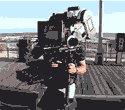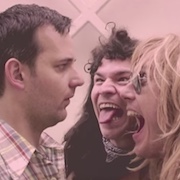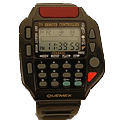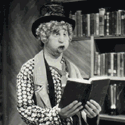|
eclipse232 posted:Thank you so much for the feedback I've been having a very hard time getting any opinions to match up. I assume the industry is in a flux with the introduction of digital formats and lack of standards. On my last production one of the drives got ingested incorrectly, leading to almost 15 minutes of footage disappearing and nobody at the post house bothered to inform any of us on set about it (where we could've done something about it). So we didn't find out until well into editing! Post house claimed the mistake was made on set, which I furiously denied since all the footage that left the set got checked immediately. We found out it was an ingestion error when the director connected the backup drive (an exact copy of what the posthouse got) to his own laptop and found all the footage there. I'm still not entirely sure how they lost almost 15 minutes, they never adequately explained it to me, but if the director hadn't taken it on himself to find out if it was really true, we would've needed to reshoot and an innocent crewmember's reputation would've gone to poo poo! So remember your ABC...Always Be Checking!
|
|
|
|

|
| # ? May 17, 2024 20:33 |
|
When I work for CBS Interactive I'm given all the footage in 720P DVCPRO HD because that's the best thing for their online flash player. When I shoot for Chevron, they want everything in 1080i HDV, although they accept 1080i DVCPRO HD which is what I always give them. Most clients are happy with H264, so long as they're not planning on doing any additional editing. Best thing is to just know as many different codecs and setups as possible and be prepared to mix and match a LOT. Everybody's going to be different. Like Steadiman, I've had a lot of close calls with missing footage, so I always make and keep my own personal backup for the duration of the project. Just turned over a hard drive with hours of interviews in 1080i DVCPRO HD and as much as it pains me to devote that much HDD space to footage I've already "turned over," you never know when the hell someone is gonna turn around and say, "Oh, BTW i accidentally dropped that hard drive with all the footage and now it doesn't work... any ideas?"
|
|
|
|
Our best tool is our copy of Episode. We just ask how someone wants the footage, what works best for them, then we just render out to whatever format they want. I always tell people we can get them whatever they need as long as it isn't tape based. I like doing it on our end because I've seen some horrific transcodes that others have done with our footage. Our lifesaver for footage is FCSvr. We've always got a backup. When in the field I have multiple hard-drives so the footage is always in two different places, and when the footage travels it travels in different bags. I still remember a 3 day shoot in Toronto for a reality show. There were nearly 1000 people at the tryouts, and we had done soooo many interviews with identified characters and found characters. The crew was about 60 people with six camera crews. We had all been flown in. An arena had been rented. Our timeline was ridiculous. In short, there was no chance for a redo. Given all that I watched the series director, why he had the duffel I don't know, put a duffel containing all the field tapes on the baggage belt at the airport. By the time I got to him it was already into the mystery land of baggage handling. I asked him if he realized he just let our entire shoot disappear down a conveyor belt. Really we're talking 300k of value at least. He sweated the entire flight until it popped out last at our destination. In some ways life is easier when you are digital file instead of tape.
|
|
|
|
Steadi: Thanks for the tips, I did some pre-lighting tonight at the studio. I didn't know we were shooting on Panasonic's new pro-sumer 3D camera. Which shouldn't effect my lights too much, except for the fact that even though their lense is rated to a 1.8 it is taking 8k watts of light 4x2k fresnel to light our 40x20 green screen and we are still using some gain in the camera. The native ISO on the camera has to be like 100 or something equally retarded. Tiresias: The camera has a minimum convergance distance of about 8-10 feet, so we are sort of forced to put our cast about 10 feet from the wall; due to our space in the studio. I had to drive to LAX before we finished, so the DP stuck around but when I left we had successfully lit the screen/floor without throwing too much on our talent. I'm not sure what other lights I will find tomorrow morning that are set up to Key our actors and such, but whatever it is the trickiest part will be moving them to match our characters when we go for OTS shots and POVs. We are making a star wars spoof with a dental spin in 3d for a dental school. We are re-creating the fight between Darth Vader and Obi Wan. Sounds absolutely retarded, but the gimmicky-ness of the project is cool
|
|
|
|
Today I learned from a stereographer that the focal plane mark on red one cameras are actually an approximation of the actual location of the sensor, and that the depth of the sensor plane is variable based on manufacturing tolerances. Basically the whole engineering process of putting together the camera can be summed up as such. That's always great, that the depth of the sensor is variable, good luck getting that stereo rig to work, fags - Jim Jannard
|
|
|
|
I can only hope that means fewer 3D movies, great news really.
|
|
|
|
I can understand how that's kind of upsetting, but I don't think that'll be much of a problem. Sure, pulling tape may be off by a few fractions of a millimeter, but that doesn't have much relevance unless you're shooting super critical focus.
|
|
|
|
butterypancakes posted:I can only hope that means fewer 3D movies, great news really. All this means is it's something to keep in mind during initial checkout. In fact, the focal plane is something you should check on any camera before it goes to a shoot anyway, not just the RED. As long as the difference between cameras is known, this won't be an issue. It's still stupid that this kind of mistake is being made but it's not like it it's insurmountable. There's plenty of other things that the people at RED do that piss me off way, way more!
|
|
|
|
Tiresias posted:I can understand how that's kind of upsetting, but I don't think that'll be much of a problem. Sure, pulling tape may be off by a few fractions of a millimeter, but that doesn't have much relevance unless you're shooting super critical focus. More so it means the mounting plate isn't consistent to where the sensor is, meaning each time two red ones are put on a rig they have to be carefully calibrated for depth, you can't trust that they'll match up just because the mounting distance isn't identical. edit: I can't remember now since this story was off hand, but I also think it was they aren't perfectly laterally aligned either. I imagine they just squeeze the CMOS out of a cake icing tube or something I really don't know how they mess this up. From what I remember they said they'd update the manual to warn about it so if anyone has an updated one take a look and see if it mentions it. Mozzie fucked around with this message at 16:25 on Nov 25, 2010 |
|
|
|
Mozzie posted:More so it means the mounting plate isn't consistent to where the sensor is, meaning each time two red ones are put on a rig they have to be carefully calibrated for depth, you can't trust that they'll match up just because the mounting distance isn't identical. Isn't careful calibration what makes shooting 3d so hard anyway. From what I've heard careful calibration isn't anything held to just RED when doing 3d. That said, there sure are a lot of RED 3D rigs around. That's why Panny created the 3DA1. If you don't have the time and really need to run and gun, there is a camera for that. Not that the image quality matches RED but there is always a compromise.
|
|
|
|
Walnut Crunch posted:Isn't careful calibration what makes shooting 3d so hard anyway. From what I've heard careful calibration isn't anything held to just RED when doing 3d. I can say in a professional capacity that the 3DA1 sucks a fat one and is going to contribute greatly to people hating 3D. (non adjustable Inter-axial distance, or as Panasonic calls it the old way, inter-optical) Mozzie fucked around with this message at 17:27 on Nov 25, 2010 |
|
|
|
Mozzie posted:I can say in a professional capacity that the 3DA1 sucks a fat one and is going to contribute greatly to people hating 3D. (non adjustable Inter-axial distance, or as Panasonic calls it the old way, inter-optical) It's an awesome camera for low cost production. There is a whole tier of broadcast production that needs the 3da1 for it's run and gun abilities. Shoot with it's limitations in mind and it's fine. Used properly it can look awesome and get into places that a big rig can't ( without huge view and money). No it's not RED but sometimes that's okay.
|
|
|
|
What would you recommend for someone just starting out working with cameras? I want to learn more about cinematography, but I don't know where to begin.
|
|
|
|
Does your city/town/podunk have a local access TV station? Those usually offer classes and equipment, a lot of times for free if you're a member.
|
|
|
|
Rogetz posted:Does your city/town/podunk have a local access TV station? Those usually offer classes and equipment, a lot of times for free if you're a member. I live in a town just outside of Columbus, OH. I just checked via Google, but there don't appear to be any local access TV stations close by. The nearest one I've found is in Dayton, an hour and a half away.
|
|
|
|
CoolZidane posted:What would you recommend for someone just starting out working with cameras? I want to learn more about cinematography, but I don't know where to begin. If it was me, I'd do this: Get any camera you can, doesn't matter what quality, what it shoots to, or whatever. The important thing is that you're out shooting. There are tons of great books on cinematography, but you also want to watch tons of movies and just shoot a LOT. Watch your angles and see how they make you feel, make your friends feel. Bad angles will make people uncomfortable, they will subconsciously react to an off-balance shot or canted frame that doesn't serve a purpose. You don't need an HD camera to learn, although I would say that a camera that can shoot at least 16x9 would be a good investment, since that's the way lots of stuff is going. Those little Flip HD camcorders are nice, just over $100. But then it's also about what YOU want to learn. There's a lot more to cinematography than just cameras, and there's a lot more to filmmaking than just cinematography. Are you sure all you want is to be a Director of Photography/Cinematographer/Videographer/Camera man? If you're not interested in any of the other career fields than that's a good start, but there's a lot more involved in cinematography, too. You'll need to learn how to light, as the DPs best friend is the gaffer. On a lot of my old shoots, the gaffer was the next-in-line to DP, not the cameraman, because the gaffer knew the lighting, which was more important to the crew than having someone who could line up a shot and pull the trigger. Ultimately, film is the art of cheating. If you learn how to shoot scenes to hide the tricks, and get the shots and angles you want, then you'll have gotten where you want to be. That'll depend on you, though.
|
|
|
|
bassguitarhero posted:If it was me, I'd do this: Get any camera you can, doesn't matter what quality, what it shoots to, or whatever. The important thing is that you're out shooting. Thanks for this. I guess my main reason for wanting to learn about cinematography is that I want to have some decent general knowledge of the different aspects of filmmaking.
|
|
|
|
CoolZidane posted:What would you recommend for someone just starting out working with cameras? I want to learn more about cinematography, but I don't know where to begin. Look at lots of paintings and fine art photography. Learn lots of principles of design, composition, shapes, color theory, etc. Then, buy a film SLR and light meter, and learn about what different focal lengths, f-stops and shutter speeds look like. Learn the zone system. Take lots of photos and play with composition. Then, buy some lights (clip lights, china balls, and tungsten balanced worklights) and light scenes and take some photos. Learn three-point lighting. Get one of those packs of gels that come with different levels of ND, diffusion, and different colors and a roll of blackwrap. See how you can shape light, eliminate double-shadows, and create depth. See what happens when a light is moved closer or farther away, or a foot up or down. Then, look at as many photos in galleries and magazines as you can and try to figure out how they were lit. An easy tip is to look in the refections in peoples eyes. Sunglasses make it really easy. Also, try to guess what the focal length of the lens was and how far away from the subject the camera was. After you have done all that, then you can begin to think about using a video camera.
|
|
|
|
Two Worlds posted:Look at lots of paintings and fine art photography. Learn lots of principles of design, composition, shapes, color theory, etc. There's like one good piece of advice in all this. Learn about composition and lighting, agreed. There are things that are common between photography and videography, but then there are things that are solely in the realm of videography (audio and camera movement, for instance). Don't buy a film SLR if you want to do videography. Don't spend lots of time practicing photography if you want to do videography. Don't buy a light meter unless you think you'll actually be shooting on film (you won't). Just buy/borrow a cheap video camera and shoot. Use a tripod. Set everything to manual and try different exposures. Practice pulling focus.
|
|
|
|
If you want to learn overall filmmaking, then you want to do lots of different stuff. The big ones you want to focus on are editing, directing and of course cinematography (doesn't mean other roles aren't important). Doing these three taught me the most. You can't just learn to shoot pretty shots, because even as a DP your job is to accentuate the story with your shots. You have to think big picture, not just the one on your viewfinder. Trying to do too many things, or doing them inconsistently, takes away from the story. Editing is great because you get a feel for how everything flows as a piece. I learned more about being a DP from editing than I did almost anywhere else. Seeing how parts locked in together and the importance of consistency in image and sound (room tone, oh god, room tone) helped me become a much better cameraman. Directing, of course, not just because of how to manage your actors, but how to manage your crew. You need to get everyone on the same page and keep them there. This isn't really specific advice, more things to try and do and learn. You want to make stuff, and make as much as you can. At first it will be bad. Then, hopefully, you will get better. But it takes time. If you can get folks together on a semi-regular basis to make a film about anything, get it edited and on the Internet, then you will have accomplished the same thing that every professional strives to do. Hell, getting people together is the toughest part. After that it's just a matter of getting better.
|
|
|
|
Jalumibnkrayal posted:There's like one good piece of advice in all this. Learn about composition and lighting, agreed. There are things that are common between photography and videography, but then there are things that are solely in the realm of videography (audio and camera movement, for instance). He didn't say videography, he said cinematography. That's shooting a movie, not someone's wedding. And the best way to learn how to be a good DP is to first work with a single frame, and when you have perfected you skills there, move on to the real thing. And how on earth can you tell anyone interested in cinematography not to use a light meter? Even on video, it's essential to get your mind used to thinking in lighting ratios. I don't know a single DP out there that doesn't constantly have his light meter out, yes, even for video.
|
|
|
|
Two Worlds posted:He didn't say videography, he said cinematography. That's shooting a movie, not someone's wedding. And that is obnoxious and inaccurate.
|
|
|
|
I think we can all agree that the most important thing is practice. I wouldn't put too much emphasis on paintings, as it was only recently that painters started to understand perspective. Photography is helpful, you can learn to tell a story in a shot, but that's not too often useful for shooting movies - the shot happens inside the story, but the nature of films requires a different attention to detail - multiple shots, eyelines, matching shots, cutting on action, canting frames for emotional moments, and of course balancing your frame for power struggles between characters. Thats why I say to watch more films, since you learn a more particular language for film, and it helps you learn how to frame specifically for movies. EDIT: Also, I don't use light meters. I've got one, but I can't remember the last time I used it. Maybe '07. But then I mostly do run-n-gun docs so pulling out a light meter is a bit silly, I just make liberal use of the zebras. bassguitarhero fucked around with this message at 23:44 on Nov 27, 2010 |
|
|
|
bassguitarhero posted:I think we can all agree that the most important thing is practice. I wouldn't put too much emphasis on paintings, as it was only recently that painters started to understand perspective. I never used to pay much attention to paintings and stuff like that. I then started learning film and cinematography. I also ended up taking a post-Enlightenment culture class (where we learn about history from the mid-1700s onward and then learn about the art therein) in my last year of university, and it wasn't until after I started learning how image works that I started appreciating the crafting of a painting. I mean, I still don't quite get it, but now I get composition and lighting and things like that. It's still a different ballgame and all, but any extra influence can help.
|
|
|
|
Just placed the order for the AF-100. I'm crazy excited about getting this camera. Matched with a nikon adapter we're going to be able to do so many great things. Super-wide, telephoto, macro, it's going to be such a good companion for our 2/3 inch hpx-500 which is a total workhorse, but renting specialty $40 000 lenses for it is no fun.
|
|
|
|
Sign me up in the 5d club. Just waiting for the camera, a 16-35mm IS II lens, 70-200 IS lens, and a few more toys to show up. Can't wait to start shooting stuff with it. Just need a monitor, 50mm, and a good shoulder rig for it. I missed out on a Red Rock Micro Eye Spy deluxe kit with a bunch of extra goodies on ebay for 1075. Bummed about that one.
|
|
|
|
Two Worlds posted:He didn't say videography, he said cinematography. That's shooting a movie, not someone's wedding. And the best way to learn how to be a good DP is to first work with a single frame, and when you have perfected you skills there, move on to the real thing. I think it's crazy to expect someone who wants to try filmmaking to first become a perfect photographer. They have different challenges, and the poor sod could spend years perfecting his Rembrandt triangle. Then when he finally transitions to video/film, he realizes that everything moves and it shits all over his pretty three point lighting setup. quote:And how on earth can you tell anyone interested in cinematography not to use a light meter? Even on video, it's essential to get your mind used to thinking in lighting ratios. I don't know a single DP out there that doesn't constantly have his light meter out, yes, even for video. That sounds like a doctor wearing a stethoscope around his neck while talking to you about a sprained ankle.
|
|
|
|
Jalumibnkrayal posted:That sounds like a doctor wearing a stethoscope around his neck while talking to you about a sprained ankle. It might be in their pocket but it never leaves their side Also three of our Red cameras came back yesterday with the MX upgrade. As a first year grad student I have to coerce a second year cine specialist into letting me play with the camera too but I'm pretty pumped.
|
|
|
|
.
exp0n fucked around with this message at 00:57 on Nov 30, 2014 |
|
|
|
Jalumibnkrayal posted:I think it's crazy to expect someone who wants to try filmmaking to first become a perfect photographer. They have different challenges, and the poor sod could spend years perfecting his Rembrandt triangle. Then when he finally transitions to video/film, he realizes that everything moves and it shits all over his pretty three point lighting setup. Yes, because stethoscopes also aren't ever used to check blood flow or anything, but it doesn't matter because your opinion is wrong and you are stupid for having it. I am sure Stanley Kubrick was just being a jackass when he said that to understand cinema you must have a strong understanding of photography. Having experience on the behaviour of light, exposure, image, language of composition or perspective must be a real useless toolset to have when you can just throw a 50mm lens on your 5D and start making cinema right on your macbook! edit: look mom, this looks so great on this 3 inch screen! And it looks wonderful on youtube!! PS, I keep a light meter in my backpack sometimes if I find a cool location and I want to get a general idea of ambient light, but why should i care about lighting when I can crank the ISO up to a billion and then process the h264 footage in premier pro CS5 on my macbook with a desnoise filter and upload it to vimeo for 6 people to see. Mozzie fucked around with this message at 01:12 on Dec 1, 2010 |
|
|
|
Mozzie posted:I keep a light meter in my backpack all the time if I find a cool location and I want to get a general idea of ambient light Changed for me
|
|
|
|
I need some camera advice, and not the boring old DSLR vs video camera question. I'm looking at an original HVX on craigslist for $3000, with a brevis 35mm adapter, 5 batteries, and 1x31gb 1x8gb and 1x4gb P2 cards. This is a good deal, right? I've logged upwards of 400 hours of shooting on the HVX and probably 800 hours on a DVX, so I am pretty sure I know what to look for when I go to check it out. Especially wear and tear around the firewire port. But is there anything I should keep in mind? I haven't been behind any camera other than my little point and shoot still camera and my iPhone in two years, so I am really excited to get back into shooting. Thanks!
|
|
|
|
That sounds like a really good deal to me. The camera + P2 cards would be worth that in good shape, throw in the adapter and it's a steal. Well, maybe not a steal as it IS an old camera, but mine still gets me a lot of work and I know it'll be a workhouse for years to come. EDIT: If you do buy it, one thing I would try to do is get another P2 of matching size, 32 being the best if you can swing one, it's always nice to have a card of the same size to roll on while you're offloading. I've shot a 3 hour wedding in a single take on matching 4GB P2s but it was not fun. Powerbooks are also cheap and the 15" will take P2 cards directly for offloading. bassguitarhero fucked around with this message at 02:22 on Dec 1, 2010 |
|
|
|
bassguitarhero posted:That sounds like a really good deal to me. The camera + P2 cards would be worth that in good shape, throw in the adapter and it's a steal. I get that it is an old camera, I'd love the HPX-170 or AF-100, but I am really fond of the HVX and know how to get a half decent picture out of it. I figure with the price being what it is I'll be able to pick up the accessories that will make it into a nice setup, including another card. I've luckily got an old 15" powerbook that I'll have to haul out of storage. Hopefully I can snag this, wish me luck goons!
|
|
|
|
king of lunch posted:I get that it is an old camera, I'd love the HPX-170 or AF-100, but I am really fond of the HVX and know how to get a half decent picture out of it. I've got a 32GB P2 E-Series card I'm trying to sell. $450 and it's yours.
|
|
|
|
Jalumibnkrayal posted:That sounds like a doctor wearing a stethoscope around his neck while talking to you about a sprained ankle. A cinema DP that doesn't use a light meter is an amateur or a total hack and will likely go nowhere in their career. SquareDog fucked around with this message at 11:44 on Dec 1, 2010 |
|
|
|
Lots of strong words going on in this thread, not a lot of discussion on the specifics of cinematography. Out of curiosity, who works on set here? I know Steadiman does, and I've worked for a number of years (started in camera department, worked as G&E for a while and now I'm doing lots of Steadicam). So, who rigs 12 by's, who hustles road runners or lays cable, who pulls focus... and who's just talking out of their rear end?
|
|
|
|
I work at a rental house in Hollywood. Otherwise I direct. Occasionally DP or AC, but "director" is the only thing on my business card. So far it's working out pretty well. 
|
|
|
|
An excellent question! Film and Media undergrad, three years of working where I crewed some films and made some of my own, and now I'm a graduate student in film production at Florida State University. And I seriously do carry my light meter in my back pack. It's saved us a couple times on set when my dumb grips/camera team forget to check our truck/filters case for a light meter and we get to set and don't have one.
|
|
|
|

|
| # ? May 17, 2024 20:33 |
|
I mostly shoot docs so I'm rarely on sets. Music videos here and there, I've got a couple coming up but 90% of my work is run-n-gun doc stuff.
|
|
|

















